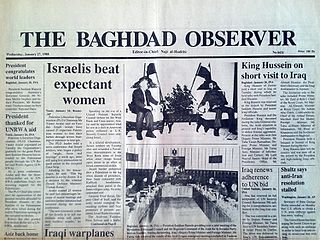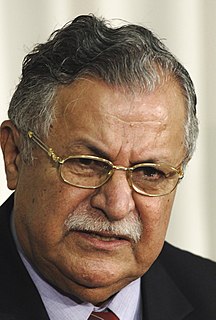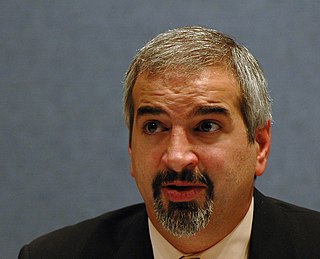A Quote by Jay Inslee
Things are difficult enough about Iraq without the Federal Government suppressing the truth about Iraq.
Quote Topics
Related Quotes
Democracy in Iraq will be an example that the Arab population will look to with great interest. And some Arab governments are concerned about democracy in Iraq, not because Iraq will be an aggressive state against them, but rather by the example that will be set by a successful federal democratic state in Iraq.
Iraq at one time was actually a functioning government. It's a real state. Afghanistan is not Iraq. It's tribal. It's got a different - a number of different sects, never really had a solid government there running the country on any kind of a continuing basis. Well, to rebuild the nation of Afghanistan is going to be more difficult than rebuilding the nation of Iraq.
I am very optimistic about - about Iraq. I mean, this could be one of the great achievements of this administration. You're going to see 90,000 American troops come marching home by the end of the summer. You're going to see a stable government in Iraq that is actually moving toward a representative government.
Under extremely difficult circumstances (Iraq) pursues the inherently complicated task of rebuilding the country. Yet Iraq continues, courageously, to reach for the promise of a democratic, federal and pluralistic state, where generations of oppressed Iraqis will regain their dignity, freedom and the right to join the civilized and progressive nations of the world.
Coverage of Iraq has plummeted, because people in power no longer want to talk about it suddenly. Journalists should be over there demanding front-page coverage, lead-story coverage every day. They should be demanding that no politician running for federal office can go to bed until they say what the hell they're going to do about Iraq and what how accountable they are for it.
I made a movie to explain to the American public what had been achieved in regards to disarmament of Iraq and why inspectors aren't in Iraq today and detailing the very complex, murky history of interaction between Iraq, the United Nations and the United States. It is most definitely not a pro-Iraq movie. It is a pro-truth movie.
I certainly have no regrets about overthrowing Saddam Hussein. I'd do it again. And, yes, there are a lot of things that I think we'd all do differently. Maybe we made some erroneous assumptions about the fabric of the society in Iraq and about the solidity of some of the institutions. And yes, there are a lot of things I would do differently. I'd probably work to rebuild Iraq from the outside in, rather than concentrating so much on Baghdad, for instance.
I am proud of the decision of this Administration to overthrow Saddam Hussein. I am proud of the liberation of 25 million Iraqis. And I'm proud to see an Iraq that is now emerging with a stronger government, a truly multiethnic, multi-sectarian government that's about to have its second set of elections, that's inviting private investment into Iraq, and that is making peace with its Arab neighbors.
Afghanistan would have been difficult enough without Iraq. Iraq made it impossible. The argument that had we just focused on Afghanistan we'd now be okay is persuasive, but it omits the fact that we weren't supposed to get involved in nation-building in Afghanistan.In my new book, I open with a quote from Donald Rumsfeld. In October 2001, he said of Afghanistan: "It's not a quagmire." Ten years later there are 150,000 Western troops there.































